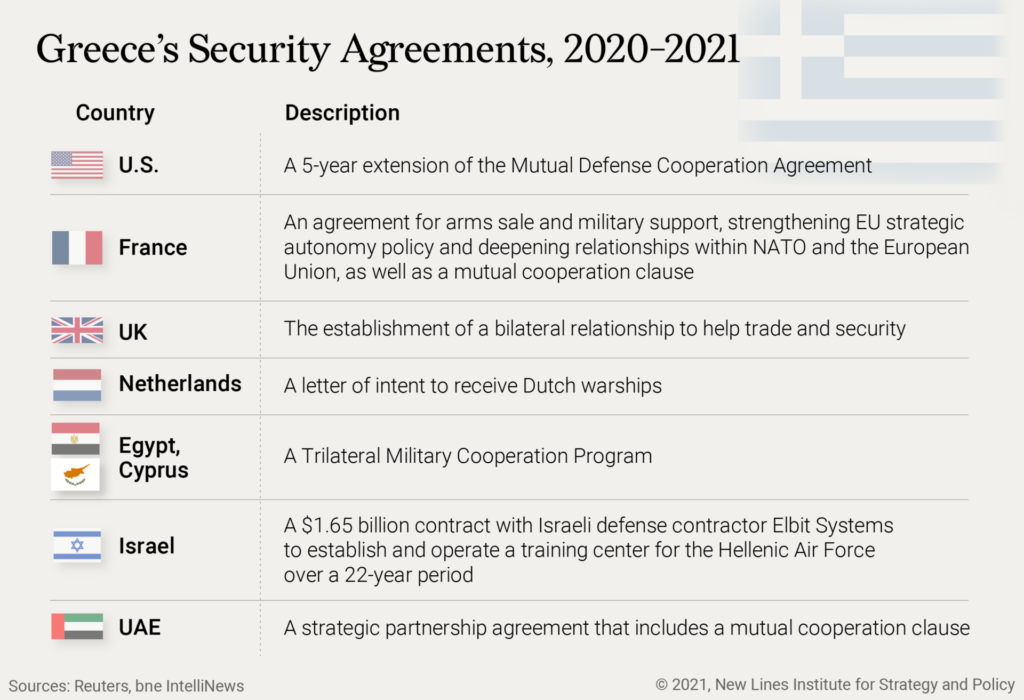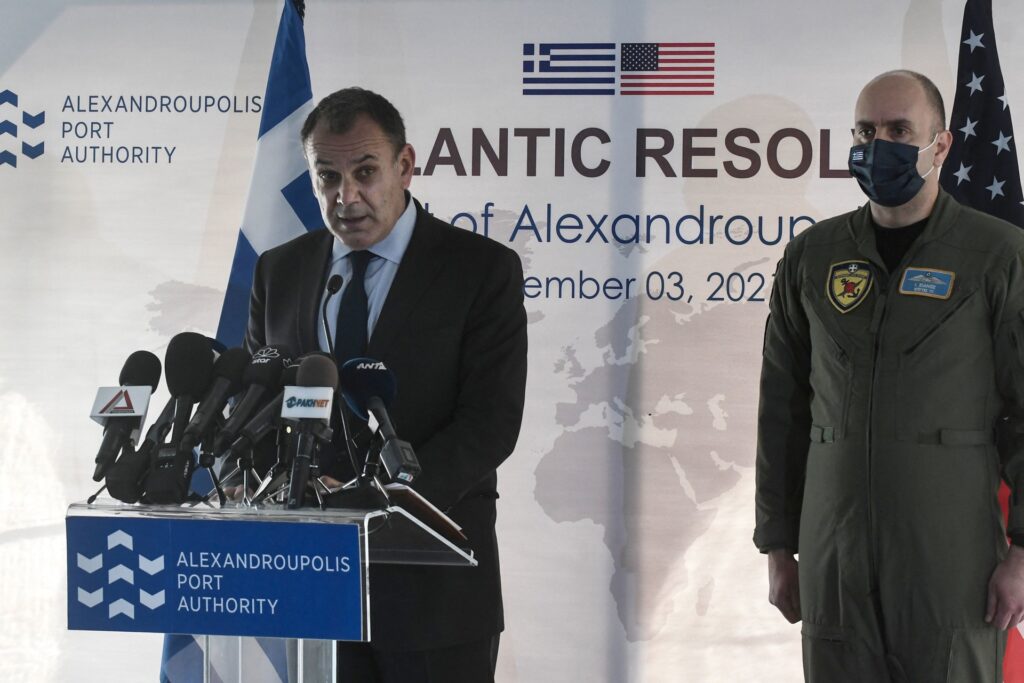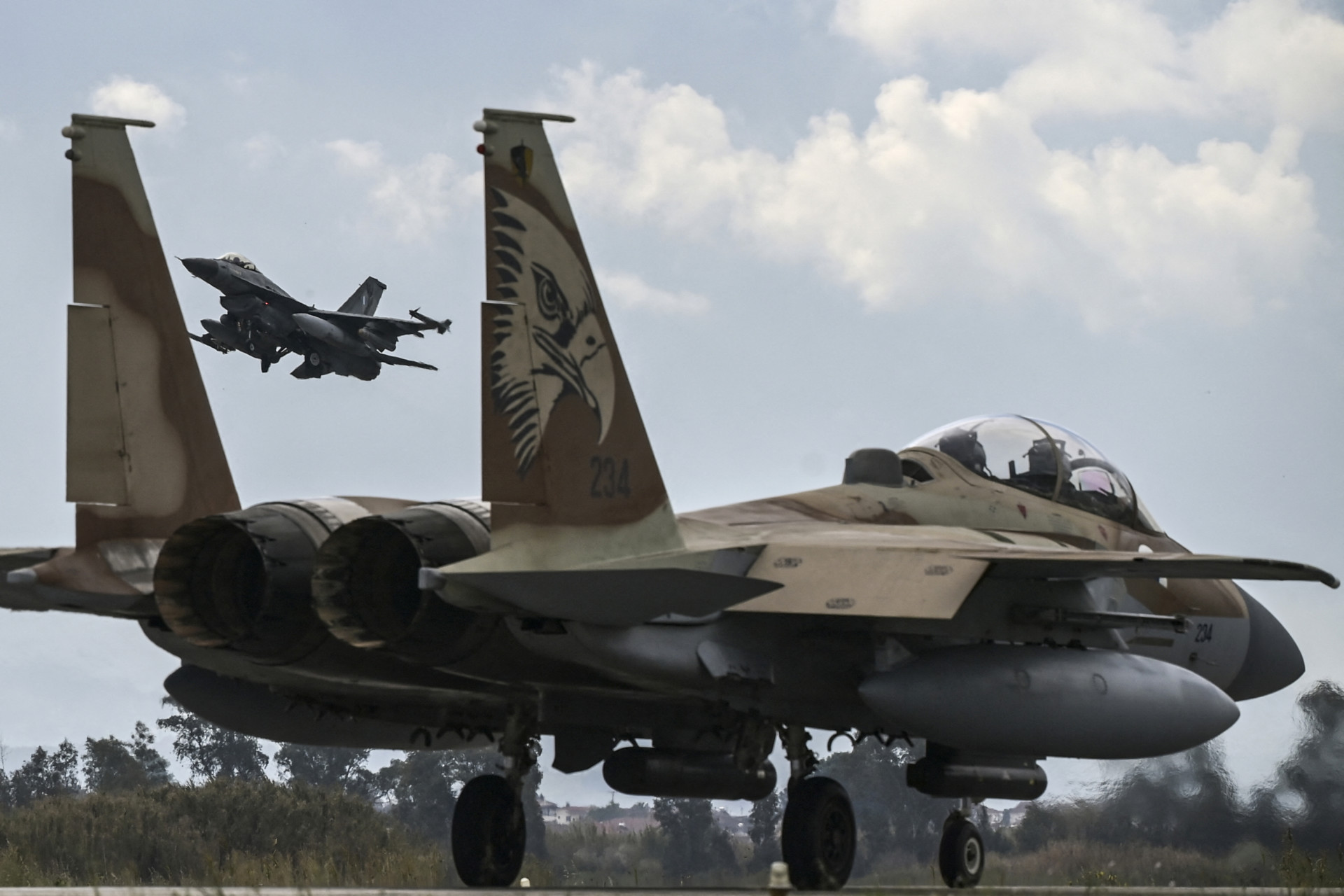For many years, Greece only imported high-tech weaponry from abroad; in fact, Greece was the biggest importer of armaments in the EU between 2007 and 2012, according to SIRPI’s online data. The Greek debt crisis, which lasted from 2009 to 2018, accentuated the dual capacity of the defense industry as both an agent and a victim of the country’s financial malaise.
Yet the Greek defense industry was the star at Defense Exhibition Athens (DEFEA) in July 2021. Not only did Greek defense companies display their new, made-in-Greece weaponry alongside other established defense exporters such as Israel, they also reached several deals with foreign customers. This surprising turnaround coincides with Greece’s re-armament program amid recent tensions with Turkey and Athens’ quest for security through alliances, defense pacts, as armaments deals, and defense industrial cooperation.
A Micrography of Greece’s Malaise
The foundations for the Greek defense industry lay in the Cyprus Crisis of 1974. Greece’s subsequent withdrawal from NATO’s military wing and the rising tensions with Turkey over the Aegean underlined the need for an indigenous defense industry and to reduce its dependence on the United States. State-owned corporations such as EAB, ENAE, EΛΒΟ, and ΠΥΡΚΑΛ aspired to manufacture or co-manufacture most of the weaponry that the Greek armed forces needed, from tank munitions to jeeps and aircraft engines. In other words, self-sufficiency, not exports, was the stated objective.
This objective would prove hard to reach as the industry evolved. As early as the 1980s, these companies were gradually transformed into ΔΕΚΟ (public utility corporations) with almost zero exports and an army of excess employees that relied on the state (through subsidies or contracts from the country’s army) for their survival. In other words, the defense industry gradually degenerated into a public organization for the “service” of political favors.
Ahead of the debt crisis, the Greek defense ecosystem was a micrography of the country’s systemic and chronic malaise: corruption, cronyism, a labyrinth bureaucracy, a nonexistent industrial agenda, bulky and bankrupt state-owned companies, a small and unsupported private sector, and no connections between the industry and academia.
Indeed, the defense industry was one of the most fertile grounds for corruption in Greece in the 1990s and 2000s; indicatively, the only politicians ever arrested and imprisoned on corruption charges during the debt crisis were associated with the procurement of weapons. Cronyism and clientelism also afflicted the state-owned defense companies. Although bankrupt, these oversized companies continued to employ thousands of supporters from the ruling parties and to be administered by friends of the two parties – at the expense of an increasingly ailing economy. Several plans for the privatization or reform of these corporations were met with stiff resistance from groups such as weapons middlemen and unionists.
And while the governments occasionally supported the virtually bankrupt state-owned companies with quick fixes in the form of state subsidies, their privately owned counterparts struggled against over-taxation and a labyrinth bureaucracy. Far worse, the governments usually inked these multi-billion-dollar armaments deals with only negligible industrial offsets. In other words, Greece did not adopt the “developmental state theory” of its two neighbors, Israel and Turkey, so as to implement a program of import substitution and nurture their embryonic defense industry. Because of its “armaments diplomacy” vis-à-vis the most important armaments exporters (namely, France, Germany, Russia, and the U.S.), Greece never achieved a level of self-sufficiency in the military sector. Only 9% of the Greek Army’s needs were covered. In fact, Athens never developed a coherent industrial policy after 1981, which partly explains the country’s bankruptcy in 2009.
The colossal armament program of Greece in the aftermath of the Imia Crisis in 1996 between Greece and Turkey was an iconic case study. From the 22 billion euros (or 28 billion dollars), the vast majority of them were direct assignments to the foreign defense industries which offered negligible benefits to the Greek defense industry and, instead, fattened the wallets of the (Greek and foreign) arms dealers and corrupt politicians.
However, this “armaments diplomacy” never offered Greece the level of security that it desired with respect to Turkey. Greece persistently asked NATO, the EU and most importantly the U.S. to commit in writing to the defense of the sovereignty and sovereign rights, but this request was never granted.
The Years of Woe and Debt
EU legislation and policies of economic austerity during the debt crisis only worsened Greece’s woes. Under a strict austerity policy, Athens reduced its defence budget by 30% and did not procure new weaponry or even initiate the modernization of its aging weapons systems for over a decade. This austerity affected both the state- and privately-owned defense industries, both of which depended on the Greek Ministry of Defense contracts. For several years, less than 10% of the ministry’s budget was allocated to the maintenance of critical weapons systems – for example, the Hellenic Air Force. These defense cuts would persist until 2020, when a pair of incidents – the Evros Crisis in March and the Cesme Crisis in July – ratcheted up tensions with Turkey.
Three years into the debt crisis, Greece adopted European Directive 2009/81/EC, which stipulated the establishment for a joint markets for defense within the EU and thus the abolishment of the “protection” that the defense industry of every EU member-state enjoyed. Due to its problematic situation (small size, heavy debts, and negligible exports), the defense industry of Greece was disproportionately affected.
Partly because of pressure by the Troika and partly because of economic pragmatism, successive Greek governments assented from 2013 onwards to the privatization of the bankrupt state-owned defense corporations (ΕΑΣ, ΕΒΟ, ΕΝΑΕ, ΕΑΒ) in spite of the expected political cost. Despite several trials, none of these companies been privatized before the end of the debt crisis in 2018 and, therefore, a problematic situation (with an accompanying political and economic cost) persisted.
The Beginning of a Turnaround
The sector’s stabilization in 2020 can be ascribed to three main factors: the privatization of these bankrupt state-owned industries by foreign investors, the re-armament program of the Greek Ministry of Defense, and private corporations’ emphasis on exports and cooperation with key foreign players such as Israel.
The privatization and consolidation of the state-owned corporations was completed in mid-2021. Subsequently, the ΕΑΣ recorded zero net losses for the first time in nearly 17 years because of export orders, including from Egypt and the U.S. The ΕΑΒ inked a deal with the UAE’s defense ministry that, among other things, envisions in-depth cooperation in UAVs – a sector to which Greece belatedly allocated its focus after Turkey unveiled its Bayraktar TB2 drones. The ΕΛΒΟ was auctioned off in 2020 to the Israelis, who intend to use it as their “forward export base” in the Balkans. And the ENAE, Greece’s most troubled shipyard, was finally privatized in July 2021 after a years-long saga over its bailout. A happy ending also manifested for the Neorion Shipyards – a privately owned yet bankrupt corporation.
These bailouts could not have arrived at a more opportune moment: Greece inked a major deal with France about the procurement of frigates and corvettes in September 2021 and, per Greek sources, some of these vessels will be manufactured in Greece and the “know-how” will be transferred to the Greek shipyards.

Greece’s re-armament program, which may exceed 11.5. billion euros by 2025, will offer its defense industries new contracts with the Ministry of Defense. In fact, local defense companies have supplied the Greek military with made-in-Greece weaponry such as drones and speedboats in growing numbers from late 2020 onwards – a trend that will only be reinforced in the near future.
This program also will involve allied states with established defense industries – most notably, Israel, France, the UAE, and the U.S. Either as investors in now-healthy corporations (e.g. ΕΛΒΟ) or as partners in the co-production of key weapons such as new frigates in the ENAE and Neorion Shipyards, these countries can act as a force multiplier for the still-nascent Greek defense industry.

Nowhere else was this shift more evident than the EU’s various tenders in defense. Despite fierce competition from European defense giants such as France’s Thales Group, Greek defense companies secured nearly 1/3 of the upcoming projects the EU’s Permanent Structured Cooperation in 2020. Indeed, they will participate in 5 of the 16 projects under the European Defense Industrial Development Program and in 1 of the 8 research projects in the Preparatory Action on Defense Research.
Thanks to the industrial synergies with the defense corporations of allied EU countries (most notably, France), the Greek defense ecosystem laid the foundations for healthy growth. Such synergies may remedy one of the chronic illnesses of the Greek defense ecosystem: the shortage in funds for research and development. One of the other problems, the absence of a nexus between universities and defense industries, is gradually decreasing as academic institutions join hands with the industry for certain projects – most notably, drones.
The new right-wing Greek government went one step further, concluding comprehensive defense accords with the UAE and France in November 2020 and September 2021, respectively. These agreements included a clause for mutual defense against any “security threat against their sovereignty and sovereign rights.” Though not mentioned explicitly, this wording most likely alluded to Turkey in light of the rising tensions between Ankara and Athens.
These accords substantially upgraded Greece’s defense and diplomatic capabilities. Now a member of a broad network of partners and allies, Athens displays a “visible” presence in key fronts – from Libya (e.g. the participation in the “Libyan Stabilization Initiative” in fall 2021) to the Gulf (e.g. the drills between the Hellenic and Saudi air forces in Crete and the deployment of a battery of MIM-104 Patriot in Saudi Arabia in late 2021). These partnerships and pacts also facilitated the penetration of the Greek defense companies in “virgin markets” so far – primarily the Gulf. According to an August 2021 interview with Georgios Michailaris, secretary of the Hellenic Manufacturers of Defense Materiel Association (or ΣΕΚΠY), the defense exports to Gulf countries (primarily, Saudi Arabia) increased by 50% in the last two years.

The Current State of the Greek Defense Ecosystem
In 2020, Greek defense companies inked their biggest deals to date. Four privately owned defense companies (Intracom Defense Electronics, EODH, Theon Sensors, and Skytalis) inked new deals that exceeded 255 million euros ($300 million), according to interviews with Michailaris; Sotirios Kyriakidis, journalist for ΑΠΕ-ΜΠΕ; John Nikitas, head of DefenceReview.gr,; and a media officer from Intracom Defense Electronics. These deals represented a 20% increase in the value of their contracts on a year-to-year basis. All of the clients for these deals are foreign, originating not only from these firms’ traditional market in the EU but also from the Middle East. According to a catalogue by the ΣΕΚΠΥ, the contracts of other private-owned companies totaled 54.5 million euros (οr 78.59 million dollars) in 2019. However, the catalogue does not specify whether these contracts were signed with the Hellenic Republic or foreign clients.
The Greek defense ecosystem currently consists of 80 companies, a 22% increase since 2020. Most of these companies undertake military and civilian projects alike. Only half of them, four state-owned and 35 private, execute solely defense-related contracts. These 39 companies employed 6,268 people in 2019, and their operations’ cycle amounted to 318 million euros. These 39 firms can be further categorized as such: 25 small (less than 2 million euro annual turnover), 11 small-to-medium (less than 50 million euros) and 3 medium (greater than or equal to 50 million euros). And indicatively of the Greek defense ecosystem’s status, not a single one of these 39 companies exceeds 100 million euros in annual exports. The only exception would be METKA of the Mytilinaios Group with a 2.26 billion euros (or 2.68 billion dollars) annual turnover. The METKA, however, executes civilian and military projects alike.

The vast majority of these defense industries specialize in new technologies such as drones and light weaponry such as thermal cameras, not heavy weapons. However, synergies with foreign defense companies could allow the Greek defense ecosystem to co-manufacture heavy weaponry – most notably, corvettes or jeeps – after the transfer of the necessary knowledge.
The Future of the Greek Defense Industry
DEFEA was an exhibition for the display of made-in-Greece weapons and a forum for new contracts between Greek and foreign defense companies, meant to showcase the new dynamism of Greece in the fields of military diplomacy and defense industry. This rebranding campaign occurs at as Athens re-positions itself in the Eastern Mediterranean and the Middle East.
Athens commenced a re-armament program (the first one since 2008) and drastically expanded its network of partners and allies, from an “entente cordiale” with Egypt over the Libyan crisis and the Cyprus dispute to advanced defense cooperation with Israel and Saudi Arabia. Most notably, Greece concluded two military pacts – one with France, a member-state of the EU and NATO and one with the UAE a country outside Europe and the Eastern Mediterranean. Interestingly, this network involves several countries already associated one way or another with each other: for example, France is an ally of the UAE and a partner of Egypt.
This new axis in the Mediterranean and Middle East slowly emerges with the tacit consent – if not support – of the United States. The Biden administration appears to consider Greece a “front-line state” for the U.S. in the Eastern Mediterranean in light of Washington’s transactional – and often strained – relationship with Turkish President Recep Tayyip Erdoğan. The visit of U.S. Sen. Bob Menendez to Greece and Cyprus in August 2021 in his capacity as the chairman of the Senate Defense Committee and signing of the defense deal between Washington and Athens in October 2021 (with a direct remark to the protection of Greece’s sovereignty and sovereign rights as per international law) reinforced the idea that the countries are in a honeymoon period.
This could facilitate the growth of the Greek defense ecosystem. Athens has asked Washington for critical offsets in exchange for the leasing of Greek military bases, including allowing Greece to participate in the F-35 defense consortium after the removal of Turkey and the grant of secondhand weaponry such as M-117 Guardian armored security vehicles. Thus, Athens could secure a privileged access to critical new technologies and participation in joint defense projects – both to the benefit of the Greek defense corporations.
Greece could augment its current success by establishing a ministry of industry and an undersecretariat for the defense industry, along the same lines as Israel and Turkey have, in order to outline a coherent, long-term industrial policy. It also should allocate additional funds for defense research and reduce its dependence on the EU; similarly, export revenues should be directed to research to create a funding cycle for the defense ecosystem. Greece also could see advances by imitating its neighbor and rival, Turkey, demanding as much transfer of institutional knowledge as possible in its joint defense programs with its allies and partners.
The incumbent Greek government should ensure that the re-armament program of Greece after two crises with Turkey in 2020 and the two military pacts with France and the UAE will offer tangible benefits to the Greek defense industry and not end in the same way as the colossal armaments program in the aftermath of the Imia Crisis.
Editor’s Note: a shorter version of this paper appeared first at the Begin-Sadat Center for Strategic Studies.
Dr. Spyridon Plakoudas is employed as an Assistant Professor of Homeland Security at Rabdan Academy (Abu Dhabi, UAE). He specializes in the civil wars in the Middle East (most specifically, Syria and Libya) and the Balkans and his forthcoming book under Rowman and Littlefield examines the employment of the YPG / SDF as proxy warriors by the USA amidst the Syrian Civil War. He served in the past as an advisor to the Hellenic General Staff and a research fellow with think tanks in Greece.
The views expressed in this article are those of the author and not reflective of an official policy or position of the New Lines Institute.






